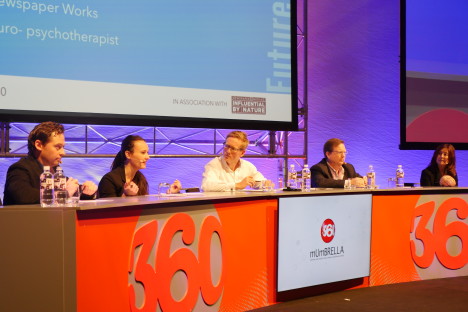Journalists need to get better at considering their audiences says Walkley winning reporter

(l-r) Nick McKenzie, Katie Rigg-Smith, Rob Pyne, Mark Hollands, Trish Stafford
Agencies should “reframe the question” to be disruptive and break through complacency while even experienced journalists are “hopeless at asking the key questions” according to the head of Mindshare and a top investigative journalist.
Speaking on a panel about asking the right questions at the Mumbrella 360 conference in Sydney Mindshare’s Katie Rigg-Smith explained: “For us, when we get the brief, that’s the part where you need to actually reframe the question.
“We get a brief telling us to do something: raise awareness, launch a brand. But that’s not actually the question we need to be answering.”
The panel convened by X or Y Decisions founder Rob Pyne also featured The Age investigative reporter Nick McKenzie, The Newspaper Works CEO Mark Hollands and Neuro-psychotherapist Dr Trish Stafford.
“There’s a great case study of Michelin Tyres, where the brief was to sell more tyres,” Rigg-Smith continued.
“They had the question but what they realised was that their tyres were so good that that was the wrong question to be answering. So they reframed it to ‘How do we get people to drive more?’
“That reframe of the brief and question actually led to an amazing campaign around driving tours and getting people in their car and using their tyres properly.”
She said and said that a two question approach was needed to reframe the approach an agency takes.
“Curiosity about what the brief is actually asking us is the first question. We have what we call a coaster challenge. You have to get the question on a beer coaster if it’s actually going to be the right question to answer,” Rigg-Smith said.
“The second question is around what you’re asking of the audience. How are they behaving? Why are they acting the way they are?”
“You need to get away from your desk. I have been thrown out of supermarkets for spending too long in the aisle watching people. I’m thrilled when my staff say to me: ‘Can I take half a day off to pretend to buy a car? Because I want to figure out what’s happening.'”
“So we all need to get away from that desk in order to be curious about the right question about people to answer ”
Dr Stratford told the audience that asking curious, emotional questions was crucial to keeping listeners engaged.
She said: “Unfortunately, the brain regurgitates ninety per cent of the thoughts we had yesterday. So we’re absolutely highly unoriginal.
“A lot of that is do with how we ask questions. The brain goes to sleep very quickly. The way that we keep it awake is through asking questions – we have to ask curious questions because this keeps the pre-frontal cortex awake. It’s the newest part of our brain and it’s where we make decisions and experience choice. It’s what differentiates us from the ape.
“So the pre-frontal cortex: to keep in engaged if you’re asking someone questions, you need to ask curious questions and you need to have some emotion in the question.”
McKenzie, investigative journalist with The Age and Four Corners, said journalists needed to properly consider their audiences when framing their stories.
“As a reporter, one would think I’d be great at asking questions, that the entire Age newsroom and the Four Corners staff would be great at asking questions. But we’re hopeless at asking a really key question.
“We haven’t said to ourselves: why aren’t people reading something? Why don’t people care about our work? Getting information is, in some respects, the easy bit. The hard bit for me is asking the question as to why people aren’t connecting to my work.”
McKenzie, a seven-time Walkley award winner, said that he asks himself ever day how he can personalise his stories further.
“Often my work can be very complicated, but it can be very sexy as well. It’s about selling the information. Journalism is about changing policy and enlightening people. If we’re not connecting to our audience and asking the question ‘Why isn’t the work I’m doing connecting?’ then I’m not asking the key questions,” McKenzie said.
“Here’s an example: Organised crime imports a huge amount of drugs, billions of dollars into Australia each year. I’ve done Four Corners reports, media reports in the newspapers but people never really seem to connect to it. I never until perhaps recently asked the question of why. One of the answers to that is central to the whole issue, which is that Australians are great consumers of drugs.
“Because the whole concept of an organised crime syndicate is very unfamiliar. But the concept of a drug user or someone doing cocaine at a party is very familiar. And that actually goes to the central thing that we want to communicate, which is personal stories.
“People connect with people, good storytelling and real-people stories.”
Jack Fisher



